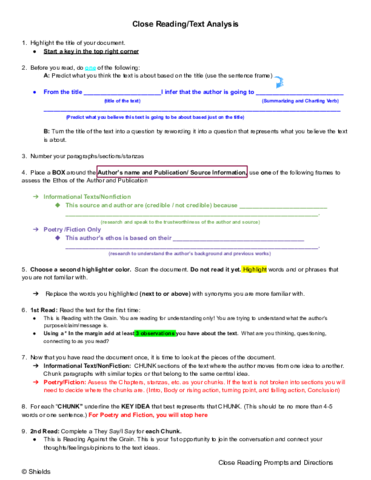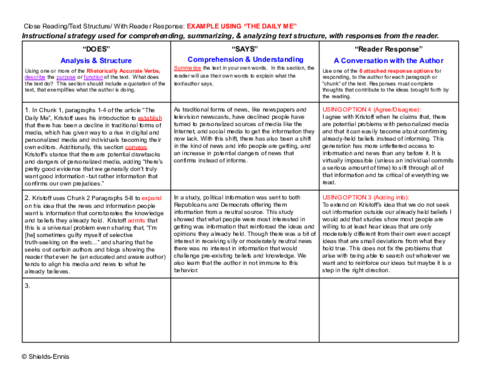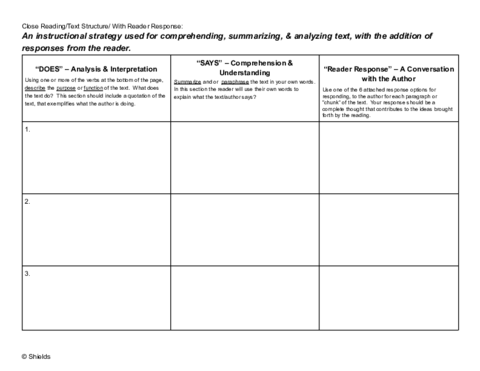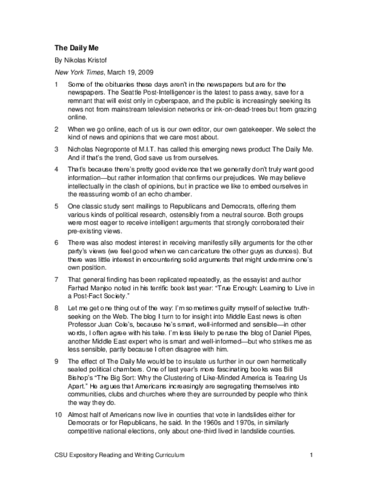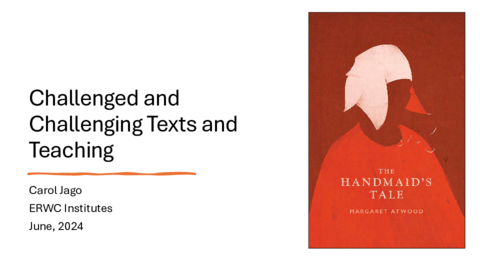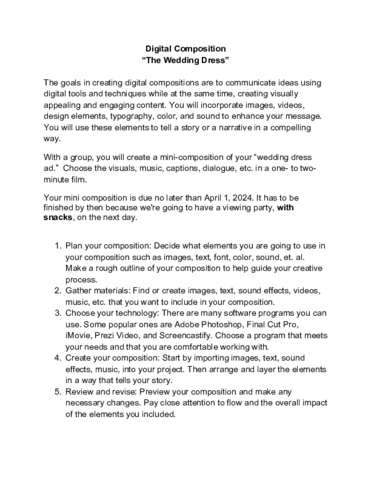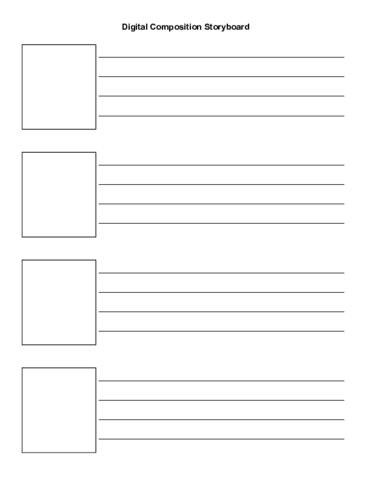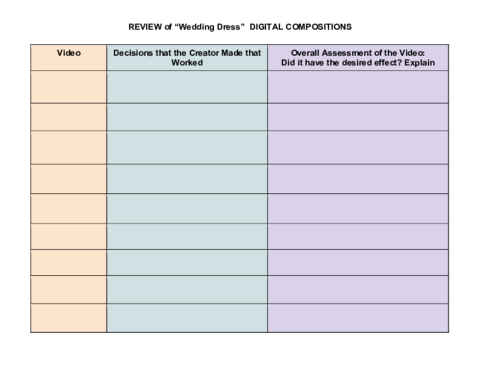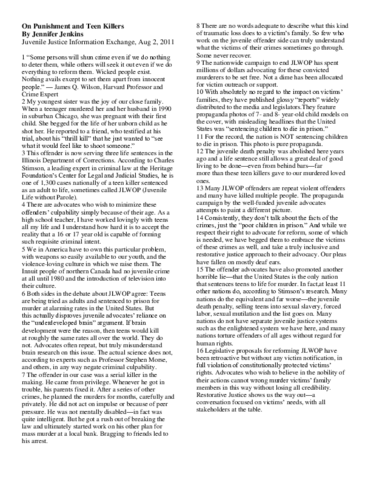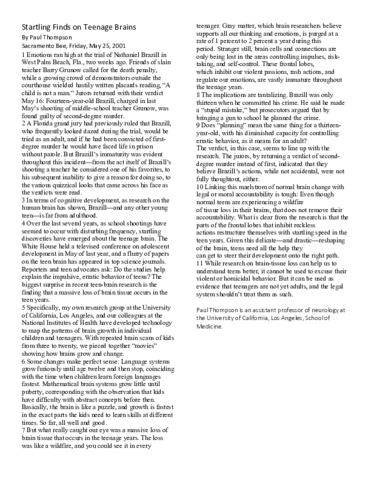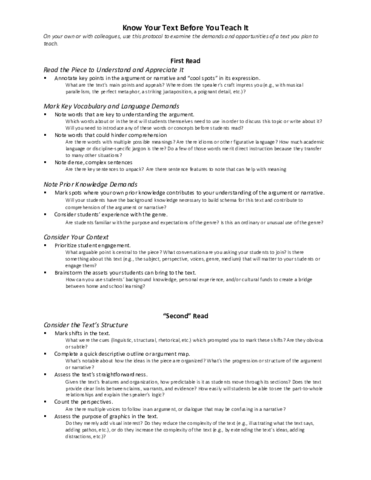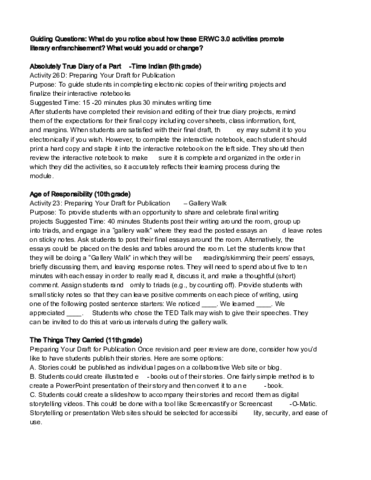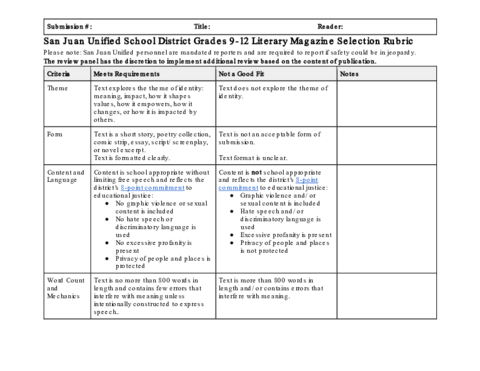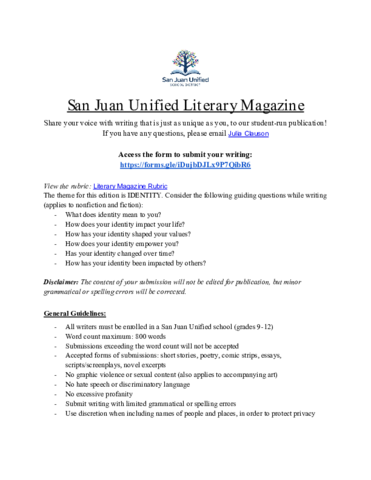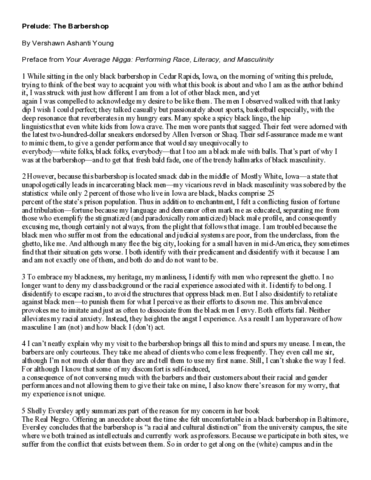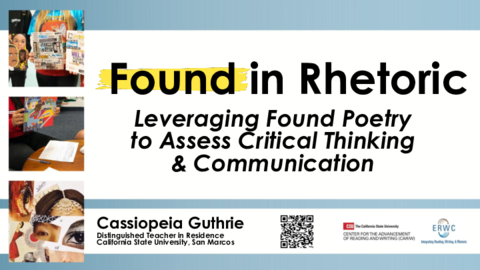Concurrent Session A-1: “Are You Reading Rhetorically? That’s Not a Question” with Maya Shields
Are you Reading Rhetorically? Come learn about essential reading, synthesis, and text analysis skills for student success in ERWC. This session will show you the key components of a text analysis process to take students into a deep reading. Add to your rhetorical reading toolbox to help students transfer reading annotations into rich conversations and writing responses. This session will be an opportunity to reflect on current teaching practices and analyze how we teach, and students learn, to read rhetorically. Conversations and activities will focus on how educators can provide students with procedural and conceptual rhetorical reading tools that start in the classroom and extend into a student toolbox.
Concurrent Session A-2: “Challenged and Challenging Texts and Teaching” with Carol Jago
Many teachers are grappling with how to work with texts that are valuable for students’ growth as readers and thinkers but that can be troubling. One purpose of literature is to “trouble” conventional ideas and challenge readers to stretch. Reading lists, rather than expanding their range of authors and content, seem to be shrinking. This session will provide a rationale for embracing rich, contemporary literature and explore classroom practices that provide scaffolding for students who often find complex text opaque.
Concurrent Session A-3: “Reasoning Rhetorically in the Age of AI” with Jennifer Fletcher
What does it mean to reason rhetorically? How does developing a line of reasoning with attention to audience, purpose, genre, and context deepen and extend students’ thinking? This session explores reasoning as a uniquely human social action and interaction. Participants examine strategies for surfacing the assumptions, beliefs, inquiry methods, and values that justify connections between evidence and claims for specific rhetors and audiences. We also practice contextualization as a tool for producing, evaluating, and humanizing complex arguments. Takeaways include activities and texts for ERWC classes.
Concurrent Session A-4: “Opening the Gateway: Leveraging Digital Compositions to Develop Critical Thinkers and Writers” with Tamara Rodriguez-Kam
Students today are digital natives. In a world bombarded by social media, students are experts when it comes to creating Instagram reels and TikTok posts. In this presentation, participants will learn to leverage student’s knowledge of digital content creation and combine it with writing instruction. During this session, participants will learn how to introduce and structure digital compositions and how to use those compositions to transition students into academic content and writing across the domains. Participants will also learn how to utilize digital compositions for cross-curricular performance tasks, increasing student transfer of knowledge. This can be modified to work for multiple grade levels and content areas.
Concurrent Session A-5: “What’s New with Universal Design for Learning? A ‘Sneak Peak’ at the Upcoming 2-Day Intensive Professional Learning” with Ginny Crisco and Erich Phinizy
This panel seeks to support rhetorical transfer by highlighting how professional learning can support best practices for designing and implementing Universal Design for Learning in the secondary classroom. In particular this panel offers a "sneak peek" into the Universal Design for Learning 2 Day ERWC intensive (for full release in the fall of 2025). The presenters will demonstrate how the new Universal Design for Learned Guidelines (Version 3.0 to be released soon) prompt us to revisit UDL strategies in ERWC 3.0 modules to support better access and challenge, while also introducing participants to a goal setting protocol that supports transfer of learning. We also hope this sneak peek will give us an opportunity to get feedback about what audience participants feel that professional learning about UDL through ERWC should be sure to address and include.
Concurrent Session A-6: “What’s ERWC?” (Part 1) with Marcy Merrill
In this double session you will learn more about the EWRC (Expository Reading and Writing Course): a bit of history, rationale, how it works, and why it has been successful. Whether you are going to teach it in the classroom or lead others as they teach it, this session will provide you with an introduction.
Concurrent Session B-1: “Giving Emotion Its Due: An Ethically Based Approach to Pathos in Argumentation” with Glen McClish
This presentation offers a second look at the role of pathos in reading and writing rhetorically. With the assistance of Martin Luther King’s final speech, “I’ve Been to the Mountaintop,” we will explore an ethically based approach to emotions in argumentation that I hope provides a fuller and more positive account of the affective side of rhetoric. Working as a group of the whole and in small groups, we will explore King’s complex synthesis of modes of argument and the ethical foundation they both stand upon and support. This discussion of rhetorical reading will lead us to consider the kinds of student writing that are enabled when emotion is embraced as an essential inventional option, rather than a potentially pernicious afterthought.
Concurrent Session B-2: “Identity: Creating a Process for Publishing Student Writing” with Rachel Nguyen and Julia Clauson
Publication is a part of the writing process that can get overlooked due to grading periods and schedules. In this session, we will explore the variety of prompts and writing opportunities students can engage with in ERWC modules and share a process for inviting students to publish their writing in a community literary magazine. We will share about our own journey toward creating a district-wide literary magazine in the San Juan Unified School District, including inviting and preparing student readers to review submissions for publication. Gain access to checklists and rubrics for inviting and celebrating a range of student writing around the theme of identity.
Concurrent Session B-3: “Teaching Analysis for Transfer” and Nelson Graff
This session will focus on teaching students how to analyze evidence both to develop ideas and to communicate them. Using writing assignments from ERWC modules, we will consider what evidence students will have assembled by the time they get to the “writing” portions of the arc, how to identify what matters in the evidence they have chosen, and how to identify the patterns in that evidence that enable them to draw conclusions. We will consider how the evidence differs when they are writing a rhetorical analysis versus a call to action to create social change. Then we’ll address how to demonstrate analysis in different genres, how to teach students to help readers to see their evidence as they see it. This will be a hands-on session, in which participants can expect to work together to evaluate evidence, evaluate analysis of evidence, and do some of their own writing.
Concurrent Session B-4: “The Voice: Navigating the Double-edged AI” with Lori Campbell
The presenter has created a module that helps students find their voices so that they will use AI generators ONLY for suggestions and not actual writing. Participants will be asked for input and will be asked to pilot the module in their classes in the fall to provide feedback to the module writer.
Concurrent Session B-5: “Extending the Pipeline: Bringing ERWC-ELD to Middle School” with Robby Ching, Debra Boggs, and Adele Arellano
This presentation offers a preview of the new ERWC-ELD middle school curriculum. Written under the auspices of a National Professional Development grant, the curriculum offers modules for grades 6 - 12. We will share module texts, which include novels, poetry, graphic novels, as well as modules that invite students to explore current issues such as plastic pollution and the benefits and dangers of the metaverse. Participants will experience some signature activities found in the new modules. They will leave prepared to begin planning for how to extend the ERWC-ELD pipeline down into middle schools.
Concurrent Session B-6: “What’s ERWC?” (Part 2) with Marcy Merrill
This session, the last of the day, will provide time for EAP coordinators and county office leads, as well as people interested in discussing the ins-and outs of processes and policies of ERWC as it pertains to their jobs, time to discuss English and specifically how their jobs relate to ERWC. The session is meant to provide answers to questions and a platform for discussion among the partners to ERWC.
Concurrent Session C-1: “Are You Reading Rhetorically? That’s Not a Question” with Maya Shields (REPEAT SESSION)
Are you Reading Rhetorically? Come learn about essential reading, synthesis, and text analysis skills for student success in ERWC. This session will show you the key components of a text analysis process to take students into a deep reading. Add to your rhetorical reading toolbox to help students transfer reading annotations into rich conversations and writing responses. This session will be an opportunity to reflect on current teaching practices and analyze how we teach, and students learn, to read rhetorically. Conversations and activities will focus on how educators can provide students with procedural and conceptual rhetorical reading tools that start in the classroom and extend into a student toolbox.
Concurrent Session C-2: “Fresh Bald Fades at Dr. V’s Barbershop: Unpacking the LGC Module and Its Most Crucial Article” with Frank Mata
In this session, participants will be exposed to the presenter's real-time approach to teaching, making pedagogical decisions, and creating classroom culture to address the difficult topics associated with the "Language, Gender, Culture" module, specifically Dr. Ashanti Young's piece "the Barbershop: prelude to Your Average N*gga: Performing Race, Literacy, and Masculinity." Participants will examine their own social positionality and its influence over their own pedagogical decisions and/or potential barriers inhibiting conversations, literacy development, and ultimately the nourishment of student voice. Potential questions tackled in this session: How does my own race and gender affect the delivery of these pieces to my students? Where am I, as the teacher/instructor, in my own understanding of racial justice and how might that indirectly affect my teaching of this module? Ideally, this session will examine specific passages from "The Barbershop" in the effort to discuss among our peers potential issues, barriers, or even awakenings from using this specific piece.
Concurrent Session C-3:“Found in Rhetoric: Leveraging Found Poetry to Assess Critical Thinking and Communication” with Cassiopeia Guthrie
In this session, attendees will engage in a project-based approach to assessment in which they become the learners. Through an immersive activity, attendees will engage with texts of their choice, generate rhetorical interpretations of their content, then apply their own personal thoughts and feelings about those subjects via poetry and art before engaging in a Poetry Read exhibition. In this hands-on workshop, attendees will investigate and discuss the application of found poetry and symbolic collages as assessment techniques in order to provide space for student agency, autonomy, creativity, and interactivity, as well as to allow learners to explore rhetorical concepts across multiple contexts.
Concurrent Session C-4:“AI and the Art of Writing: Crafting Future-Ready Students in the ERWC Classroom” with Jennifer Roberts
Explore the intersection of AI-assisted writing tools, rhetorical education, and ethical considerations. What strategies can effectively prepare students for an AI-augmented future? How do real examples of AI misuse inform our understanding of its practical and ethical challenges? How can we enhance student learning and teacher efficiency through AI integration? Discover essential skills for success in a digitally interconnected world. Presented by a 12th-grade ERWC teacher with 1:1 Chromebooks, this session promises practical insights for navigating technology's impact on literacy and rhetorical analysis. Come empower your classroom with AI literacy!
Concurrent Session C-5: “Envisioning the Future of ERWC: Roundtable on New Grade 9 and 10 Modules” with Jennifer Fletcher, Mariam Catania, and Lisa Benham-Lewis
Help us design ERWC language and literacy curriculum for grades 9 and 10! The ERWC team is developing over 30 new modules and mini-modules through funding from a 5-year Education Innovation Research Grant (EIR). In this special roundtable conversation, we discuss student-centered, inquiry-based learning experiences that support the critical transition from middle school to high school and beyond--a key focus of the grant. We want to hear your ideas for the next iteration of ERWC: What texts and issues are relevant and engaging for younger students? What are the interests, needs, and experiences of incoming high school students? What kinds of composing tasks and contexts develop students' agency and creativity? This is your chance to shape the future of ERWC!
Concurrent Session C-6: “Q&A: EAP & ERWC” with Marcy Merrill
This session, the last of the day, will provide time for EAP coordinators and county office leads, as well as people interested in discussing the ins-and outs of processes and policies of ERWC as it pertains to their jobs, time to discuss English and specifically how their jobs relate to ERWC. The session is meant to provide answers to questions and a platform for discussion among the partners to ERWC.
